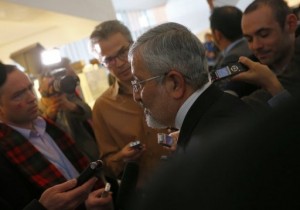 Amid a†continued stalemate†in efforts to resume nuclear talks, a key advisor to Iranís nuclear negotiating team has published a proposal he says has been previously presented to the United States and five world powers for resolving international concerns about Iranís nuclear program.
Amid a†continued stalemate†in efforts to resume nuclear talks, a key advisor to Iranís nuclear negotiating team has published a proposal he says has been previously presented to the United States and five world powers for resolving international concerns about Iranís nuclear program.The author, Mahdi (or Mehdi) Mohammadi, the former political editor of Iranís hardline†Kayhan†newspaper, is one of two key architects of Iranís nuclear negotiating strategy under the team led by Iran National Security Advisor Saeed Jalili, an Iranian source who requested anonymity said.
The other is Hamid-Reza Asgari, the low-profile legal advisor to Iranís Atomic Energy organization and non-proliferation advisor to Iranís National Security Council.†Asgari led Iranís team to technical talks†with nuclear experts from the United States and other P5+1 powers in Istanbul July 3rd.. Asgari previously met with American, as well as Russian and French diplomats, in Vienna on October 21, 2009 to discuss the details of a nuclear fuel swap deal that later fell apart amid domestic infighting in Iran.
Asgari ďis the real boss,Ē the Iranian source told the Back Channel.
ďThe two sides, according to Tehran, should first address each otherís concerns,Ē† Mohammadi†wrote in†Iran Review†January 9th:
The United States should, thus, recognize Iranís right to enrich uranium and Iran, in return, will announce that it has no plan to build nuclear weapons. In the next stage, the US and the European Union should remove all unilateral sanctions against Iran and Iran, for its part, will take immediate steps to address the remaining concerns of the International Atomic Energy Agency (IAEA) which the Western countries claim to be very important. In fact, a new round of IAEAís inspections of and access to Iranís nuclear sites will begin. In the third stage, Iran will be ready to negotiate about 20-percent enrichment provided that the United Nations Security Council will annul all its sanctions resolutions against Tehran. [...]
The proposal, which would not have Iran negotiate curbing its higher 20% uranium enrichment activities until the third step,†after†the lifting of US and European sanctions, is likely to be viewed as a disturbing sign that Iran may still not be prepared to seriously negotiate. At the same time, it could be read as an Iranian effort not to appear over-eager for a deal, ahead of anticipated negotiations Tehran does†hope will lead to sanctions relief.
ďIran is still in the opening salvo stages of negotiations, presenting its maximalist demands,Ē Mark Fitzpatrick, an Iran expert with the International Institute for Strategic Studies (IISS), told the Back Channel Tuesday. ďAnd clearly these so-called reciprocal concessions are not in the ballpark for what the six powers can accept. Because Iran is not really giving up anything other than 20%. No mention of Fordo, of its stockpile [of enriched uranium] and no limits on its 5% production.Ē
ďConsidering that [Iranian President Mahmoud] Ahmadinejad repeatedly said Iran could stop 20% in exchange for fuel for [the Tehran Research Reactor] TRR, now Iran is demanding everything for stopping 20%,Ē Fitzpatrick continued. ďThat is not a reasonable position for the P5. And they [the Iranians] need to get in the room and talk seriously.Ē
The publication of Tehranís proposal comes as†western negotiators have been waiting†with growing discouragement for Iran to respond to numerous attempts to schedule a new round of talks with six world powers.
ďWe have spoken to them a number of times since before the new year and have offered dates and venue, but they still donít come back with a straight answer,Ē Michael Mann, a spokesperson for European Union foreign policy chief Catherine Ashton, told the Back Channel Monday.
Meantime, an Iranian parliamentarian floated the possibility that Iran may suspend talks with the P5+1 altogether, Iran media reported Monday.
ďEurope and the West want to prolong talks and they are seeking specific objectives hereby,Ē Mansour Haqiqat Pour, the deputy chair of the Majlis National Security and Foreign policy committee, was cited by Iranís IRIB broadcaster,†Mehr reported†Monday Jan. 21. ďBut as we have always said, we are ready for negotiations. But, their approach reveal that other side do not care much about it.Ē
Most likely, however, Iran will agree to come to the table, as it canít afford to be seen not to be willing to talk, analysts suggested.
ďObama really does mean Iran canít get nuclear weapons and [has] not discarded the military option, even though he doesnít like to wave it in their faces,Ē Fitzpatrick said. ďObstinacy by Iran to even talk will strengthen the military option.Ē
Though many see Iranís new Secretary of State and Defense nominees John Kerry and Chuck Hagel as favoring efforts to engage Iran, ďthe new teamÖ is going to be quickly disillusioned by the failure to talk,Ē he added.
At the same time, Fitzpatrick warned, the West is not helping advance diplomacy by constantly insisting sanctions will force Iran to make concessions.
ďItís a mis-perception that Iran is on the ropes and Ö sanctions have driven them to the negotiating table,Ē Fitzpatrick said. ďAnd I think that is a bigger factor for Iran. It doesnít want to be seen hurting so bad. And they donít want want to show over-eagerness to come† to the table.Ē
By Al-Monitor
The Iran Project is not responsible for the content of quoted articles.










